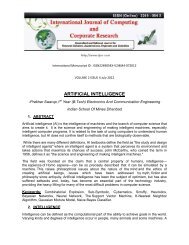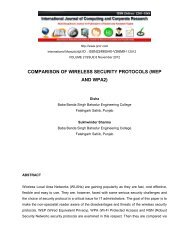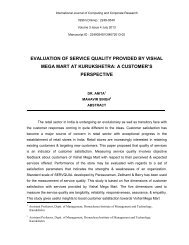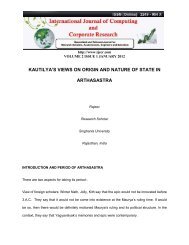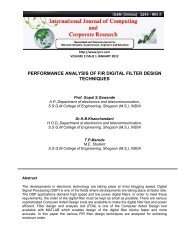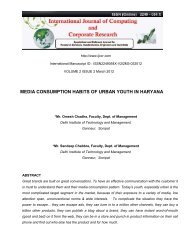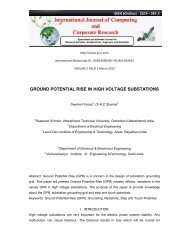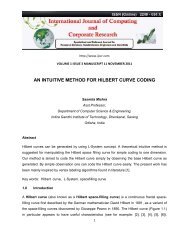success factors of erp implementation in smes in malaysia
success factors of erp implementation in smes in malaysia
success factors of erp implementation in smes in malaysia
You also want an ePaper? Increase the reach of your titles
YUMPU automatically turns print PDFs into web optimized ePapers that Google loves.
http://www.ijccr.com<br />
International Manuscript ID : ISSN2249054X-V2I6M5-112012<br />
VOLUME 2 ISSUE 6 November 2012<br />
conditions (Maldonado, 2009). Although ERP systems are implemented <strong>in</strong> large<br />
ent<strong>erp</strong>rise, SMEs are motivated to run ERP on ent<strong>erp</strong>rise (Adam & O’doherty, 2000).<br />
Indeed, ERP <strong>implementation</strong> <strong>in</strong> SMEs is not so different from large ent<strong>erp</strong>rise. SMEs<br />
try to implement ERP to raise performance <strong>of</strong> departments through ent<strong>erp</strong>rise by<br />
provid<strong>in</strong>g real-time <strong>in</strong>formation, hav<strong>in</strong>g best practices dur<strong>in</strong>g bus<strong>in</strong>ess processes, and<br />
updat<strong>in</strong>g obsolete technical platforms (Adam & O’doherty, 2000). Utterly, the largest<br />
ERP application users are <strong>in</strong>cluded such as manufactur<strong>in</strong>g, utilities, technology, high<br />
tech, and also government through Malaysian SMEs. As an <strong>in</strong>stance, manufactur<strong>in</strong>g<br />
has experienced high growth with contribution more than 70 percent <strong>of</strong> revenue and 55<br />
percent <strong>of</strong> the employment <strong>in</strong> 2003(Frost & Sullivan, 2004). Therefore, SMEs are<br />
encouraged to implement ERP to ga<strong>in</strong> more beneficial outcomes and <strong>in</strong>creas<strong>in</strong>g<br />
revenues with<strong>in</strong> the competitive market.<br />
3.4 Motivation <strong>of</strong> Implement<strong>in</strong>g ERP<br />
Companies have had different experiences <strong>of</strong> ERP <strong>implementation</strong> based on the<br />
<strong>in</strong>tention to ERP <strong>in</strong>stallations. The <strong>implementation</strong>s which produce technically-led<br />
consequences <strong>in</strong> a higher degree designed system that supports approximately and<br />
perfectly fit with the processes <strong>of</strong> the organization that it does not get an eye catch<strong>in</strong>g<br />
outcome <strong>in</strong> the short term period <strong>of</strong> runn<strong>in</strong>g. In place <strong>of</strong> the <strong>implementation</strong>s are<br />
bus<strong>in</strong>ess-led concentrated and conduct to get a higher level performance <strong>of</strong> f<strong>in</strong>ance <strong>in</strong><br />
a short term period (Velco, 2007). In fact, ERP <strong>implementation</strong> would concentrate<br />
f<strong>in</strong>ancial cost <strong>of</strong> firms by upgrad<strong>in</strong>g bus<strong>in</strong>ess process and solve concerns <strong>of</strong> bus<strong>in</strong>ess-<br />
related data flow. Companies tend to engage <strong>implementation</strong> this system.<br />
3.5 Benefits <strong>of</strong> ERP System<br />
There are a varied reasons for ERP <strong>implementation</strong> such as provid<strong>in</strong>g s<strong>in</strong>gle data<br />
source, reduce cost, <strong>in</strong>tegrate bus<strong>in</strong>ess processes while reduc<strong>in</strong>g <strong>in</strong>direct costs, high<br />
speed customer reactivity and the <strong>in</strong>creas<strong>in</strong>g productivity <strong>of</strong> <strong>of</strong>fice. Plus,



